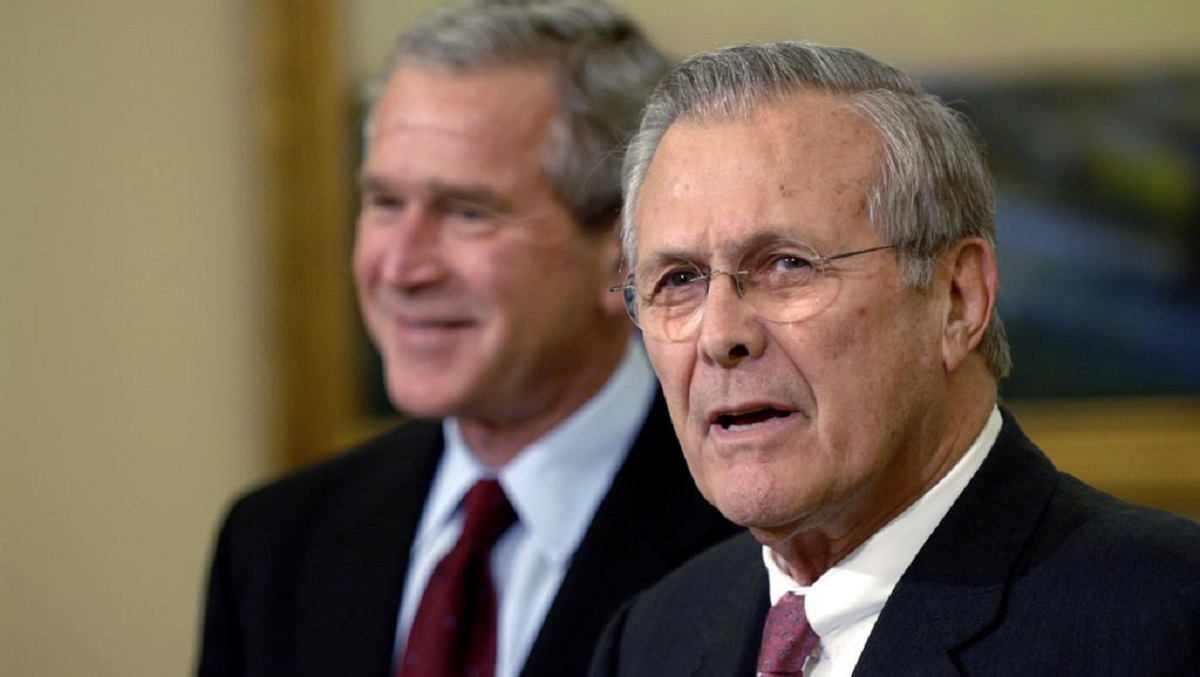
Secretary of Defense Donald H. Rumsfeld announces his resignation while President George W. Bush stands in the background. (Jim Bowman, DoD Photo)
Melvyn Leffler, a prominent historian of American foreign policy, is back in the studio for part two of his discussion with host Carrie Lee. Their conversation continues examining the decision-making process leading to the invasion of Iraq. Leffler’s insights shed light on the internal dynamics of the Bush administration, highlighting the distrust and dysfunction among key players despite their extensive foreign policy experience. The discussion also explores the role of credibility in the Bush administration’s strategy development and strategic messaging to allies and partners. The goal of the exchange is to offer valuable lessons for the next generation of military leaders and strategists, emphasizing the importance of careful analysis, clear communication, and a nuanced understanding of the limits of American power.
Hans Blix, the head of the inspection team…in December 2002, January 2003, he himself still thinks that Saddam Hussein probably has weapons of mass destruction and that it does take the threat of military force to compel Saddam Hussein, so to speak, to come clean.
Podcast: Download
Subscribe: Apple Podcasts | Spotify | Amazon Music | Android | Pandora | iHeartRadio | Blubrry | Podchaser | Podcast Index | TuneIn | Deezer | Youtube Music | RSS | Subscribe to A Better Peace: The War Room Podcast
Melvyn Leffler, Ph.D., is an American historian and educator, Co-chair of History and Public Policy Program Advisory Board at the Wilson Center and Emeritus Professor of American History at the University of Virginia. He is the author of For the Soul of Mankind (2007), A Preponderance of Power (1993), and Confronting Saddam Hussein: George W. Bush and the Invasion of Iraq (2023) He has served as president of the Society for the History of American Foreign Relations, Harmsworth Professor at Oxford University, and Dean of the College and Graduate School of Arts & Sciences at The University of Virginia.
Carrie A. Lee is an associate professor at the U.S. Army War College, where she serves as the chair of the Department of National Security and Strategy and director of the USAWC Center on Civil-Military Relations. She received her Ph.D. in political science from Stanford University and a B.S. from MIT.
The views expressed in this presentation are those of the speakers and do not necessarily reflect those of the U.S. Army War College, U.S. Army, or Department of Defense.
Photo Description: Secretary of Defense Donald H. Rumsfeld announces his resignation while President George W. Bush stands in the background
Photo Credit: Jim Bowman, DoD Photo





“The debate about Iraq in the years before the outbreak of war in March 2003 revealed a difference of view between the United Kingdom and the United States over whether the political transformation of Iraq, or of the region more broadly, could serve as a reason for intervention. The United Kingdom felt more strongly that, on its own, regime change was an insufficient reason in international law. The project of political transformation of Iraq, and of the Arab world more generally, was strong in the United States for years before 2003, to the point where it constituted a significant part of the rationale for intervention — and was perhaps more important in the minds of some policymakers than disarmament. Many advocates of transformative interventions saw something artificial in a situation where the law is such that a real reason for intervention — turning a dictatorship into a democracy — could play at best a minimal part in the debate about the legal justification for military action.” (See beginning at the bottom of Page 607 of Sir Adam Roberts’ “Transformative Military Occupation: Applying the Laws of War and Human Rights.”)